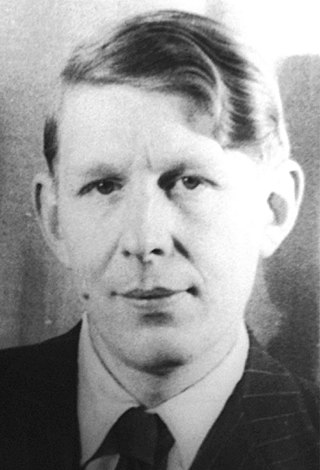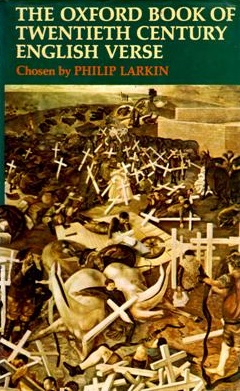
Wystan Hugh Auden was a British-American poet. Auden's poetry is noted for its stylistic and technical achievement, its engagement with politics, morals, love, and religion, and its variety in tone, form, and content. Some of his best known poems are about love, such as "Funeral Blues"; on political and social themes, such as "September 1, 1939" and "The Shield of Achilles"; on cultural and psychological themes, such as The Age of Anxiety; and on religious themes, such as "For the Time Being" and "Horae Canonicae".

Christopher William Bradshaw Isherwood was an Anglo-American novelist, playwright, screenwriter, autobiographer, and diarist. His best-known works include Goodbye to Berlin (1939), a semi-autobiographical novel which inspired the musical Cabaret (1966); A Single Man (1964), adapted into a film directed by Tom Ford in 2009; and Christopher and His Kind (1976), a memoir which "carried him into the heart of the Gay Liberation movement".

Cecil Day-Lewis, often written as C. Day-Lewis, was an Anglo-Irish poet and Poet Laureate of the United Kingdom from 1968 until his death in 1972. He also wrote mystery stories under the pseudonym of Nicholas Blake, most of which feature the fictional detective Nigel Strangeways.

The Golden Treasury of English Songs and Lyrics is a popular anthology of English poetry, originally selected for publication by Francis Turner Palgrave in 1861. It was considerably revised, with input from Tennyson, about three decades later. Palgrave excluded all poems by poets then still alive.

Rudolf John Frederick Lehmann was an English publisher, poet and man of letters. He founded the periodicals New Writing and The London Magazine, and the publishing house of John Lehmann Limited.

The Oxford Book of Twentieth Century English Verse is a poetry anthology edited by Philip Larkin. It was published in 1973 by Oxford University Press with ISBN 0-19-812137-7. Larkin writes in the short preface that the selection is wide rather than deep; and also notes that for the post-1914 period it is more a collection of poems, than of poets. The remit was limited by him to poets with a period of residence in the British Isles. Larkin's generous selection of Thomas Hardy's poems has been noted for its influence on Hardy's later reputation. On the other hand, he was criticized, notably by Donald Davie, for his inclusion of "pop" poets such as Brian Patten. The volume contains works by 207 poets.
The Faber Book of Modern Verse was a poetry anthology, edited in its first edition by Michael Roberts, and published in 1936 by Faber and Faber. There was a second edition (1951) edited by Anne Ridler, and a third edition (1965) edited by Donald Hall. The selection was of poems in English printed after 1910, which meant that work by Gerard Manley Hopkins could be included. A later edition was edited by Peter Porter.

The New Oxford Book of English Verse 1250–1950 is a poetry anthology edited by Helen Gardner, and published in New York and London in 1972 by Clarendon Press. It was intended as a replacement for the older Quiller-Couch Oxford Book of English Verse. Selections were largely restricted to British and Irish poets.

Frederick Louis MacNeice was an Irish poet, playwright and producer for the BBC. His poetry, which frequently explores themes of introspection, empiricism, and belonging, is considered to be among the greatest of twentieth century literature. Despite being renowned as a member of the Auden Group, he was also an independently successful poet with an influential body of work, which is replete with themes ranging from faith to mortality. His body of work was appreciated by the public during his lifetime, due in part to his relaxed but socially and emotionally aware style. Never as overtly or simplistically political as some of his contemporaries, he expressed a humane opposition to totalitarianism as well as an acute awareness of his roots.
The Penguin poetry anthologies, published by Penguin Books, have at times played the role of a "third force" in British poetry, less literary than those from Faber and Faber, and less academic than those from Oxford University Press..
Poems of Today was a series of anthologies of poetry, almost all Anglo-Irish, produced by the English Association.

Edward Falaise Upward, FRSL was a British novelist and short story writer who, prior to his death, was believed to be the UK's oldest living author. Initially gaining recognition amongst the Auden Group as a highly imaginative surrealist writer, in the 1930s he joined the Communist Party of Great Britain, after which his writing shifted towards Marxist realism. His literary career spanned over eighty years.

Poems is the title of three separate collections of the early poetry of W. H. Auden. Auden refused to title his early work because he wanted the reader to confront the poetry itself. Consequently, his first book was called simply Poems when it was printed by his friend and fellow poet Stephen Spender in 1928; he used the same title for the very different book published by Faber and Faber in 1930, and by Random House in 1934, which also included The Orators and The Dance of Death.
The Group Theatre (London) was an experimental theatre company founded in 1932 by Rupert Doone and Robert Medley. It evolved from a play-reading group in Cambridge that Doone had been involved with during his years studying with the Cambridge Festival Theatre. The Group Theatre was active from 1932 to 1939 and reformed as The Group Theatre Ltd. in the early 1950s.

Sir Stephen Harold Spender was an English poet, novelist and essayist whose work concentrated on themes of social injustice and the class struggle. He was appointed U.S. Poet Laureate Consultant in Poetry to the Library of Congress in 1965.
Oxford Poetry is a literary magazine based in Oxford, England. It is currently edited by Luke Allan. The magazine is published by Partus Press.
This is a bibliography of books, plays, films, and libretti written, edited, or translated by the Anglo-American poet W. H. Auden (1907–1973). See the main entry for a list of biographical and critical studies and external links. Dates are dates of publication of performance, not of composition.

Horizon: A Review of Literature and Art was a literary magazine published in London, UK, between December 1939 and January 1950. Published every four weeks, it was edited by Cyril Connolly, who made it into a platform for a wide range of distinguished and emerging writers. It had a print run of 120 issues or 20 volumes.

The Earth Compels was the second poetry collection by Louis MacNeice. It was published by Faber and Faber on 28 April 1938, and was one of four books by Louis MacNeice to appear in 1938, along with I Crossed the Minch, Modern Poetry: A Personal Essay and Zoo.
"Epilogue for W. H. Auden" is a 76-line poem by Louis MacNeice. It was written in late 1936 and was first published in book form in Letters from Iceland, a travel book in prose and verse by W. H. Auden and Louis MacNeice (1937). MacNeice subsequently included it as the last poem in his poetry collection The Earth Compels (1938). "Epilogue for W. H. Auden" reviews the Iceland trip MacNeice and Auden had taken together in the summer of 1936; the poem mentions events that had occurred while MacNeice and Auden were in Iceland, such as the fall of Seville and the Olympic Games in Berlin.












